Galaxy diferenciates itself from the previous more open world-ish and sandbox-y entries in the series by being much more focused on tight and polished level design and linear platforming. While 64 and Sunshine stages, for the most part, were built as playgrounds with different and diverse obstacles, objectives and the occasional platforming challenge to approach as you saw fit, Galaxy instead takes the more linear and abstracted moments of those games, like Tick Tock Clock in 64 or the no F.L.U.U.D. stages in Sunshine and creates a whole game around pushing the player forward through meticulous and straightforward platforming, not unlike the 2D entries.
This change in design philosophy that removes a certain level of choice and expression from the player, and the initial realization that Mario's moveset is drastically taken down a notch from the previous two games might cause disappointment at first, but the platforming layout and creativty at display in Galaxy more than makes up for those shortcomings. The pace of every single stage is perfectly constructed, moving the player from one gimmick to the next one, never wearing out their welcome, and providing a set of challenges to overcome much more well crafted and tied into a cohesive thematic idea than what 64 or Sunshine ever had. Additionally, Galaxy makes good use of it's motion controls, giving a good sense of kinesthetics and never feeling out of the player's control.
What elevates however Galaxy to the upper echelons of the Mario canon is without a doubt its presentation. The space theme provides some of the most unique and mesmerizing stages in the franchise, having Mario twirling around small planetoids, being affected by gravity pulls, being launched into flight from a moon to another, and traversing expansive windy blue skies on a dandelion, all while beautiful orchestrated renditions are played in the background, providing the whole experience a great sentiment of videogame magic and wonder. Super Mario Galaxy is a classic, for sure.
This change in design philosophy that removes a certain level of choice and expression from the player, and the initial realization that Mario's moveset is drastically taken down a notch from the previous two games might cause disappointment at first, but the platforming layout and creativty at display in Galaxy more than makes up for those shortcomings. The pace of every single stage is perfectly constructed, moving the player from one gimmick to the next one, never wearing out their welcome, and providing a set of challenges to overcome much more well crafted and tied into a cohesive thematic idea than what 64 or Sunshine ever had. Additionally, Galaxy makes good use of it's motion controls, giving a good sense of kinesthetics and never feeling out of the player's control.
What elevates however Galaxy to the upper echelons of the Mario canon is without a doubt its presentation. The space theme provides some of the most unique and mesmerizing stages in the franchise, having Mario twirling around small planetoids, being affected by gravity pulls, being launched into flight from a moon to another, and traversing expansive windy blue skies on a dandelion, all while beautiful orchestrated renditions are played in the background, providing the whole experience a great sentiment of videogame magic and wonder. Super Mario Galaxy is a classic, for sure.
